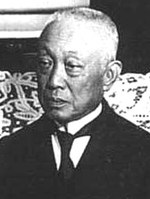Genrō
Genrō ( Japanese 元老 'elder' ) was the unofficial name for retired statesmen who were considered the founding fathers of modern Japan . They served as informal advisers to the Tennō during the Japanese Empire from the Meiji period .
The institution of the genrō has its origins in the rojū ( shogunate council) of the Edo period . The term itself was probably coined by a newspaper in 1892. It is often confused with the Genrōin (Council of Elders), an early parliament that existed from 1875 to 1890. The Genrō were however in no connection with its establishment or dissolution.
Experienced leaders of the Meiji Restoration were chosen by the Tennō as genkun - imperial advisers. With the exception of the Kuge nobleman Saionji Kimmochi , all Genrō came from lower samurai families from the fiefdoms ( Han ) Satsuma and Chōshū . Both fiefs were instrumental in the overthrow of the earlier Tokugawa shogunate in the Boshin War , which led to the Meiji Restoration. The Genrō had the right to select and nominate the Japanese Prime Minister , who then had to be confirmed by Tennō.
The first seven genrō were all former sangi (imperial advisers), a post that was abolished in 1885. The Genrō are also known as the Meiji oligarchs , although not all Meiji oligarchs were Genrō.
The institution of the genrō expired in 1940 with the death of Saionji Kimmochi.
List of genrō
| 1889 | 1891 | 1892? | 1898 | 1900 | 1902 | 1904 | 1909 | 1912 | 1913 | 1915 | 1916 | 1922 | 1924 | 1934 | 1940 |
| Itō Hirobumi ( C ) | |||||||||||||||
| Kuroda Kiyotaka ( S ) | |||||||||||||||
| Yamagata Aritomo (C) | |||||||||||||||
| Saigō Tsugumichi (S) | |||||||||||||||
| Matsukata Masayoshi (S) | |||||||||||||||
| Inoue Kaoru (C) | |||||||||||||||
| Ōyama Iwao (S) | |||||||||||||||
| Katsura Tarō (C) | |||||||||||||||
| Saionji Kimmochi ( Kuge ) | |||||||||||||||
literature
- Andrew Gordon: A Modern History of Japan. From Tokugawa Times to the Present . Oxford University Press, Oxford 2003, ISBN 0-19-511061-7 .
- Marius B. Jansen: The Making of Modern Japan . Belknap Press of Harvard University Press, 2000, ISBN 0-674-00991-6 .
- Bunji Omura: The Last Genro. Prince Saionji, Japan's “Grand Old Man” . Kegan Paul, 2004, ISBN 0-7103-0917-1 (first edition: 1937).

